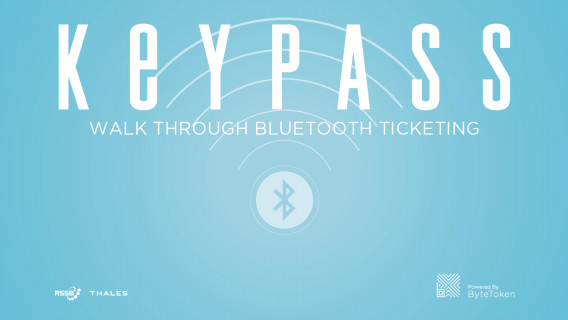A Bluetooth solution that will allow operators to track passengers with valid mobile tickets and and let them pass through the gate with no user interaction.
KeyPass hands free mobile ticketing

What is the goal of the project?
In May, 2015, ByteToken won the RSSB (Rail Safety and Standards Board) Future Railways competition held in the U.K., which was looking to find alternatives to existing gate-line and ticket detection systems in order to accommodate increased passenger flows within the same floor space. The winning approach was a research and development project that would show the potential of using Bluetooth LE, in conjunction with the ByteToken mobile ticketing app, to facilitate the process of automated fare validation, with a resultant improvement in user experience and increase in the throughput of passengers through fare gates to train platforms.
What is the result of the project?
KeyPass is easy to use. A passenger, simply downloads the ByteToken mobile app and uses this to purchase their travel rights, which are then stored on the mobile app. As they approach the fare gate to enter the transport network the app will, without user intervention, communicate with KeyPass. Once the KeyPass software has determined that the user has valid travel rights, a signal will be sent to the appropriate fare gate to open. This enables a hands free approach to checking in and out of the transport network, increasing user throughput as they no longer need to locate and present their ticket.
Keypass is the latest offering in the comprehensive range of mobile ticket validation methods that are currently available from ByteToken, which include NFC HCE, dynamic 2D barcodes as well as our original, patented V3 (visually, verifiable virtual) ticketing solution.
Who initiated the project and which organizations are involved?
RSSB (Rail Safety and Standards Board) initiated the project.
ByteToken, Ltd developed the mobile ticketing and Bluetooth LE communication - KeyPass.
Thales supplied the smart gate and software technology.
What is the next step?
We are looking for transport operators and cities to take our solution and adapt it for their own needs in a Pilot or demonstration before a full implementation of the technology.
What can other cities learn from your project?
Partnering with other industry specialists is key to the success of this project. To produce the prototype, ByteToken partnered with Thales, leading international fare gate manufacturer, who upgraded their latest smart fare gate, the Dreamgate PG600, to support the KeyPass bluetooth functionality.
KeyPass can be used by cities and transport operators across the globe as it is a Bluetooth solution that will allow operators to track passengers with valid mobile tickets and and let them pass through the gate with no user interaction. KeyPass comprises the following components:
• BLE Beacons
• Antennas
• 3D Camera
• Controller Module
The BLE beacons and associated antenna array locate the position of the user relative to the gate line, a 3D camera tracks the user as they approach, and a controller application manages the interface between the software components of the system, as well as the fare gate. These components can be configured to suit the requirements of the environment in which they’ve be placed.




